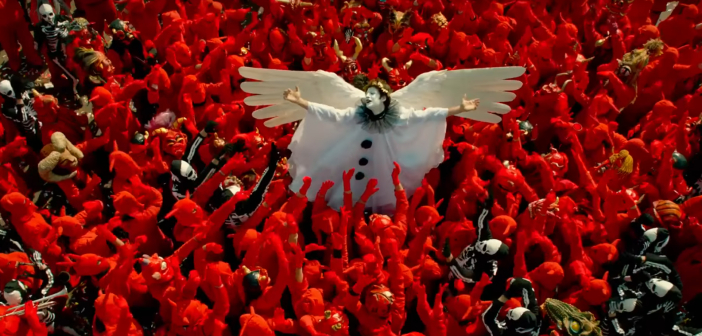A Portrait of the Artist as a Young Man | Alejandro Jodorowsky’s Autobiographical Endless Poetry
In the years between 1990 and 2013, cult surrealist and provocateur Alejandro Jodorowsky did not make a single film. For reasons, both financial and personal, he was on an extended hiatus that he may have enjoyed but we certainly didn’t. It’s fitting that when he did return, it was with a film that looked back on his life, as if the only story the 87-year old had left to tell was his own. 2013’s Dance With Reality was a bizarro musical memoir that recounted the director’s early years growing up in 1930 and 40’s Chile, complete with a mother character who sings her lines and a urinating scene that is presented to us an act of God.

Now the director has followed that film up with Endless Poetry, another mind-bending ‘reconstruction’ of his own past. Endless Poetry takes up, very literally, where Dance with Reality left off with us re-joining the boat that young Alejandro got onto with his family to start life anew in the Chilean capital of Santiago. The early stages mirror much of the action of its predecessor, with our pre-pubescent protagonist navigating life with his authoritarian father who regards any sort of attempt at creative output as nothing short of an effeminate endeavour for “homosexuals” only. Jaime, the father, while a brute is again played with a transparent vulnerability by the director’s eldest son Brontis Jodorowsky and once again the real Alejandro is a consistent on screen presence and narrator.
It’s not long, however, before Endless Poetry stakes its claim as its own kind of endeavour. In an admittedly problematic sequence where our Alejandaro enters manhood after realising he couldn’t be gay (it looks even worse written down), the actor playing him changes and a new period of his life begins. This older, more mature version is played by another of the director’s son’s, an eminently charming Adan Jodorowsky. With a burning desire to become a poet, Alejandro leaves behind life with his parents, much to the chagrin of his father, to join the city’s burgeoning movement of avant-garde artists. Many of the bohemians he meets, drinks with and mates with would go one to become mammoth figures of the Latin American world of art and literature their own right (Nicolas Parra foe example).
Relative to something like Dance with Reality, the magical realism in this film leans a bit on the realistic side than the magical one – in that there are no scenes of outlandish assassination attempts and divine interventions. This is still, however, Jodorowsky we’re talking about so don’t expect understatement and the gritty verisimilitude of a Ken Loach outing. The director regards recollection as nothing short of fabrication. He is fully aware that his own interpretation of his past is just that, an interpretation.
So rather than go for accuracy, he decides to let his own warped imagination run riot on his late teens and 20s. Artists are shown to be constantly demonstrating their talent and doing nothing else, whether that be an overzealous tenor or an airy ballerina who enjoys performing demi-pliés around the cast. A first love is presented to us as an impassioned force of nature with fiery red-hair, who drinks only in increments of 1.5 litre glasses and inspires poems about dangerous women. There are adulterous relationships involving dwarves, asides with a circus act and scenes of fatherly advice given via earthquakes. Its sounds frenzied and it is but most of it works and most of it is very, very funny.
[arve url=”https://www.youtube.com/watch?v=Gn1Bj_0KUfA”]
There’s isn’t so much a plot to speak of as there is a debatably sequential series of life events. Jodorowsky may not offer us an honest depiction of his life as young poet but what he does manage to do is capture a kind of broader truth. Endless Poetry’s manically, scattershot approach channels not just the vibrancy and frivolity of youth but also of the vitality and unsteadiness of a life devoted to art. Perhaps the most interesting aspect present is the manner in which Jodorowsy recreates the period in which the film is set, or rather the manner in which he doesn’t. Endless Poetry was funded through a couple of kickstarter campaigns and the director is almost comically upfront about this fact (Most shots, we are very aware that its 2016). Through the use of cheap sets, vaudeville-esque backdrops and even a bar that looks something straight out of Dr. Caligari’s cabinet, we are given a fascinating ever-evolving landscape that adds a fresh twist to the concept of period recreation. It may not look expensive, but it’s still far more interesting than you average, umpteenth adaption of a Dickens novel that the BBC offer every year.
There is still the odd drawback. The sense that you’re watching artsy non-sequiturs can get a wearisome on occasion, especially in a two hour plus film. There is also a gay character – the same one that kissed our main character and affirmed his heterosexuality – who ends up being treated so dispassionately by the film that one wonders if any of the director’s own father’s prejudices rubbed off on him. Endless Poetry is nonetheless a true original, and a triumphant plea for artistic exploration. It’s a strange, dizzying cinematic experience that has to be seen to be believed.

